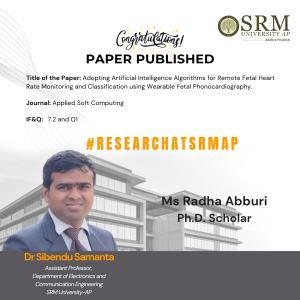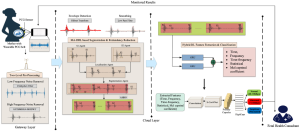 Dr Sibendu Samanta, Assistant Professor in the Department of Electronics and Communication Engineering, and Ms Radha Abburi, a PhD Scholar, have made significant strides in the field of fetal health monitoring. Their paper, titled “Adopting Artificial Intelligence Algorithms for Remote Fetal Heart Rate Monitoring and Classification using Wearable Fetal Phonocardiography,” has been published in the prestigious Q1 Journal, Applied Soft Computing, which boasts an impressive impact factor of 7.2.
Dr Sibendu Samanta, Assistant Professor in the Department of Electronics and Communication Engineering, and Ms Radha Abburi, a PhD Scholar, have made significant strides in the field of fetal health monitoring. Their paper, titled “Adopting Artificial Intelligence Algorithms for Remote Fetal Heart Rate Monitoring and Classification using Wearable Fetal Phonocardiography,” has been published in the prestigious Q1 Journal, Applied Soft Computing, which boasts an impressive impact factor of 7.2.
This pioneering study addresses the critical gaps in the analysis of Fetal Heart Rate (FHR) recordings by leveraging wearable Phonocardiography (PCG) signals and advanced AI algorithms. The primary goal of the research is to achieve accurate classification results through the remote monitoring of fetal heartbeats. Additionally, the study tackles complex issues related to data quantity and the inherent complexity of FHR analysis. Dr Samanta and Ms Abburi’s work represents a significant advancement in the field, promising to enhance the accuracy and reliability of fetal health monitoring, ultimately contributing to better prenatal care.
Abstract of the Research:
Fetal phonocardiography (FPCG) is a non-invasive Fetal Heart Rate (FHR) monitoring technique that can detect vibrations and murmurs in heart sounds. However, acquiring fetal heart sounds from a wearable FPCG device is challenging due to noise and artefacts. This research contributes a resilient solution to overcome the conventional issues by adopting Artificial Intelligence (AI) with FPCG for automated FHR monitoring in an end-to-end manner, named (AI-FHR). Four sequential methodologies were used to ensure reliable and accurate FHR monitoring. The proposed method removes low-frequency noises and high-frequency noises by using Chebyshev II high-pass filters and Enhanced Complete Ensemble Empirical Mode Decomposition with Adaptive Noise (ECEEMDAN) in combination with Phase Shifted Maximal Overlap Discrete Wavelet Transform (PS-MODWT) filters, respectively.
The denoised signals are segmented to reduce complexity, and the segmentation is performed using multi-agent deep Q-learning (MA-DQL). The segmented signal is provided to reduce the redundancies in cardiac cycles using the Artificial Hummingbird Optimization (AHBO) algorithm. The segmented and non-redundant signals are converted into 3D spectrograms using a machine learning algorithm called variational auto-encoder-general adversarial networks (VAE-GAN). The feature extraction and classification are carried out by adopting a hybrid of the bidirectional gated recurrent unit (BiGRU) and the multi-boosted capsule network (MBCapsNet). The proposed method was implemented and simulated using MATLAB R2020a and validated by adopting effective validation metrics.

The results demonstrate that the proposed method performed better than the current method with accuracy (81.34%), sensitivity (72%), F1-score (83%), Energy (0.808 J), and complexity index (13.34). Like other optimization methods, AHO needs precise parameter adjustment in order to function well. Its performance may be greatly impacted by the selection of parameters, including population size, exploration rate, and learning rate.
The title of the Research Paper in the Citation Format:
R. Abburi, I. Hatai, R. Jaros, R. Martinek, T. A. Babu, S. A. Babu, S. Samanta, “Adopting artificial intelligence algorithms for remote fetal heart rate monitoring and classification using wearable fetal phonocardiography”, Applied Soft Computing, vol. 165, pp. 112049, 2024, ISSN 1568-4946.
Practical Implementation or the Social Implications Associated with the Research
- Chebyshev filter and EC2EMDAN-PS-MODWT reduce low and high frequency noises.
- MA-DRL and optimization algorithms reduce complexity during classification.
- Machine learning spectrogram conversion to capture time, frequency, and spectral variations.
- Hybrid deep learning algorithms can be used to reduce positive rates.
Collaborations:
- Dr. Indranil Hatai (Signal Processing and FPGA, Mathworks, Bangalore, India)
- Dr. T. Arun Babu (HoD, Dept. of Pediatrics, All India Institute of Medical Sciences (AIIMS), Andhra Pradesh, India)
- Dr. Sharmila Arun Babu, MBBS, MS (HoD, Dept. of Obstetrics and Gynecology, All India Institute of Medical Sciences (AIIMS), Andhra Pradesh, India)
- Dr. Rene Jaros (Dept. of Cybernetics and Biomedical Engineering, Faculty of Electrical Engineering and Computer Science, VSB–Technical University of Ostrava, 708 00, Ostrava, Czechia)
- Prof. Radek Martinek (Dept. of Cybernetics and Biomedical Engineering, Faculty of Electrical Engineering and Computer Science, VSB–Technical University of Ostrava, 708 00, Ostrava, Czechia)
Future Research Plans:
- Design a low cost for continuous fetal heart rate (FHR) monitoring system
- Develop a proper deep learning algorithm to get a proper understanding of fetal’s abnormality.

